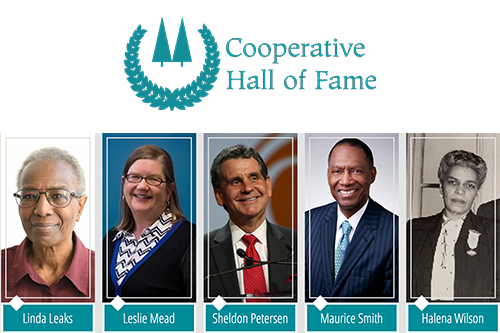 Five outstanding cooperative leaders will receive the cooperative community’s most prestigious honor on October 5, 2023, when they are inducted into the Cooperative Hall of Fame at the National Press Club in Washington, DC.
Five outstanding cooperative leaders will receive the cooperative community’s most prestigious honor on October 5, 2023, when they are inducted into the Cooperative Hall of Fame at the National Press Club in Washington, DC.
The inductees are: Linda Leaks, Co-Founder, Ella Jo Baker Intentional Community Cooperative; Leslie Mead, Retired Executive Director, Cooperative Development Foundation; Sheldon Petersen, Retired Governor and CEO, National Rural Utilities Cooperative Finance Corporation (CFC); Maurice Smith, CEO, Local Government Federal Credit Union; and Halena Wilson, Unsung Hero, Past President, Ladies Auxiliary to the Brotherhood of Sleeping Car Porters.
“This year’s inductees represent the breadth and inclusiveness of the cooperative sector in addressing the needs of communities,” said Rich Larochelle, Chair of the Cooperative Development Foundation’s Board of Directors. “The inductees have helped people gain access to financial services and financing, to affordable housing, to energy resources and home care services—all through member-owned cooperatives. They also represent well Principle Six—cooperation among cooperatives, through providing financial support and philanthropy across sectors and cooperatives.”
 Linda Leeks
Linda Leeks
Co-Founder, Ella Jo Baker Intentional Community Cooperative
Dubbed “the Godmother of DC Housing Cooperatives” Linda Leaks’ organizing of tenants for housing justice and housing cooperatives is legendary in the DC community. Leaks often worked seven days a week, on an organizer’s pay.
When Leaks moved to DC in 1978, gentrification was in brutal full force, which presented conditions that were a great match for Leaks’ expertise and 10 years of experience as a community organizer in Florida. She enrolled at the University of the District of Columbia, and later earned her master’s degree in community economic development from Southern New Hampshire University.
In 1982, Leaks led the founding of a collective house in Northwest DC with three other black women. Known as the “T Street Collective,” it became a hub of black feminist organizing in a depressed neighborhood still dotted with boarded up buildings and with hardly any businesses.
In 1986, she got her first job as a tenant organizer with Washington Inner-city Self Help (WISH), whose mission was, in part, to help organize tenants to form limited equity housing co-ops to maintain their homes. Over the next decades, Leaks led battles to convert dozens of apartment buildings into housing cooperatives in DC, coaching frightened tenants on how to manage cooperatives, protest, advocate and otherwise overcome city officials, landlords, and developers intent on pushing people out in favor of luxury high-rent housing. As Leaks worked to secure co-op ownership for tenants, she developed educational materials and trainings uniquely designed to help renters transition to owners.
Leaks later became Executive Director of WISH, where she also attempted to build complementary cooperative businesses such as a management cooperative for the housing co-ops and janitorial services to service those cooperatives. Leaks even took her organizing skills to South Africa, where she helped organize in the early 1990s the first housing cooperatives in Johannesburg.
 Leslie Mead
Leslie Mead
Executive Director, Cooperative Development Foundation, retired
Through policy, education, and philanthropy, Leslie Mead has worked to promote cooperatives by quietly and resolutely motivating organizations and individuals to think more broadly and deliver more deeply, not only for their most vocal members and constituents, but equally for those without such voice.
After growing up in Indiana and attending college in Iowa, Mead moved to Washington, DC and took a job with the National Council of Farmer Cooperatives (NCFC) as assistant general counsel. After a decade with NCFC, she moved into her role as an independent consultant, where she developed education projects for NCFC, set up the Leadership Scholarship Program for the newly formed Ralph K. Morris Foundation, and served as the executive administrator for the Association of Cooperative Educators (ACE).
Building upon its historic strengths, while redirecting resources to meet a more diverse contemporary and future audience, Mead helped ACE re-establish itself as a premier educational organization, with uniquely cross-cultural offerings. Mead then moved on to expand the impact of cooperative philanthropy, first as executive director of The Cooperative Foundation and then at the Cooperative Development Foundation (CDF).
During her tenure at CDF, Mead took on the herculean task of consolidating multiple funds under management, which lowered the costs of fund administration, and enabled CDF to invest more strategically and impactfully in cooperative development. She increased operating revenue by 64%, operating surplus by five-fold, and grant giving by ten. Though CDF supports every cooperative sector, among Mead’s most notable accomplishments is her work structuring and funding the Cooperative Home Care Initiative, a network to support a particularly vulnerable group of American workers. One of her parting contributions was the Unsung Cooperative Hero category launched in 2021 to recognize the contributions to cooperatives by members of historically overlooked and marginalized communities.
 Sheldon Peterson
Sheldon Peterson
Governor and CEO, National Rural Utilities Cooperative Finance Corporation (CFC), retired
A charismatic leader with a passion for the cooperative business model, Sheldon Petersen’s vision and commitment to strengthening rural electric cooperatives helped transform the National Rural Utilities Cooperative Finance Corporation (CFC) into a $27 billion, mission-focused financial services cooperative.
Born and raised in western Iowa, Petersen started his cooperative career in 1976 as a staff assistant with Nishnabotna Valley Electric Cooperative in Harlan, Iowa. In 1980, he became general manager of Rock County Electric Cooperative Association in Janesville, Wisconsin, before joining CFC in 1983 as an area representative where he provided financial management consultation to rural electric cooperatives.
In 1995, Petersen was promoted to CEO, where he established a strategic vision for CFC to be electric cooperatives’ “most trusted financial resource.” Under his leadership, CFC helped to preserve and strengthen cooperatives that would otherwise not exist, while cultivating a culture of innovation that saw CFC develop new financing programs to expand credit options and keep costs low for rural electric cooperatives and their communities.
Petersen’s relentless advocacy of the cooperative business model to investors greatly expanded the influence and reputation of cooperatives on Wall Street to benefit rural Americans. Petersen also ensured that CFC and its affiliate, National Cooperative Services Corporation, became a major supporter of NRECA International’s efforts to bring electricity to remote communities around the globe.
He also actively supported the formation of new electric cooperatives, such as Kaua’i Island Utility Cooperative in Hawaii, and ensured CFC became a committed supporter of the U.S. Department of Agriculture’s Rural Cooperative Development Centers, which provide technical assistance to help develop new cooperatives and support existing ones.
Petersen retired from CFC in 2021 but he continues to maintain close ties to the electric cooperative network. In 2022, he was presented with the prestigious Clyde T. Ellis Award, which honors those with a legacy of exemplary contributions that support the principles and progress of rural electrification and the development and use of natural resources.
 Maurice Smith
Maurice Smith
CEO, Local Government Federal Credit Union
Maurice R. Smith’s leadership style to welcome challenges, analyze options, and keep moving forward has effectively served his mission to support and promote credit unions to improve the lives of consumers through access to affordable financial education and services.
Growing up on a farm near Southport, North Carolina, Smith was taught by his father about the power of money and the importance of sound management of credit to economic empowerment. After attaining a Bachelor of Science degree in Business Administration from the University of North Carolina at Wilmington, Smith began his financial services career as a loan officer for State Employees’ Credit Union (SECU) in North Carolina.
Smith joined Local Government Federal Credit Union (LGFCU) as Executive Vice President in 1992 and became President/CEO in 2002. Under Smith’s leadership, LGFCU has become the fourth largest credit union in North Carolina, with more than 400,000 members and assets exceeding $3.5 billion. Fueled by a desire to address members’ demands for new technologies and services, Smith led the unprecedented move to create Civic, a sister credit union with service delivery solely through digital channels. Always with an eye on economic justice, LGFCU has been certified by the NCUA as a Low-Income Designation (LID) Credit Union and the U.S. Treasury designation of Community Development Financial Institution (CDFI), for support of low-wealth communities. During his tenure at LGFCU, he has also earned a Juris Doctorate from the North Carolina Central University School of Law.
Among Smith’s most forward-thinking contributions within the cooperative world is the Eighth Cooperative Principle of Diversity, Equity and Inclusion (DEI), formally adopted by the Credit Union National Association (CUNA) and currently under discussion by the International Cooperative Alliance.
 Halena Wilson
Halena Wilson
Unsung Hero, Past President, Ladies Auxiliary to the Brotherhood of Sleeping Car Porters
The 2023 Unsung Cooperative Hero, Halena Wilson, was a selfless and tireless crusader for co-ops, a co-op organizer, educator, and advocate. Born in Denver in 1897, she was conscious of a benevolent streak from an early age.
After moving to Chicago as an adult, she found an outlet for her compassion, joining several social and civic movements and served as a Worthy Matron of the Order of the Eastern Star, a fraternal, non-profit mutual aid organization open to both men and women. Similar to experiences she had leading mutual aid societies, Wilson found a place for herself in the Ladies’ Auxiliary to The Brotherhood of Sleeping Car Porters (BSCP) where according to Paula Pfeffer, “she could be of real service in a cause that was seeking to liberate a much-exploited people.”
It was through her involvement in the Auxiliary, where she served as president of the Chicago chapter until 1953 and president of the entire International Ladies’ Auxiliary until 1965, that Wilson realized her potential as a consumer cooperative educator and organizer. As president of the BSCP’s Ladies’ Auxiliary, she helped to start and support at least 17 co-op study groups in BSCP chapters in major cities in the US and Canada, and was a cofounder of two or more co-ops, including The Brotherhood Buying Club and the Cooperative Union Optical Center in Chicago. She also supported the development of the BSCP’s Walker Credit Union in Montreal.
For years she regularly contributed articles to the Black Worker and created pamphlets on cooperative economics and consumer co-op strategies. Understanding the economic role of women in the household, the buying power of women, and the need to recirculate resources (especially good union wages) within the Black community, she raised the awareness of cooperative alternatives in Black communities around the country for decades.
One of the few Black women to be elected to serve on the national Consumer Cooperative Council, she represented important alliances between the labor movement, the civil rights movement, the women’s movement, and the cooperative movement.


